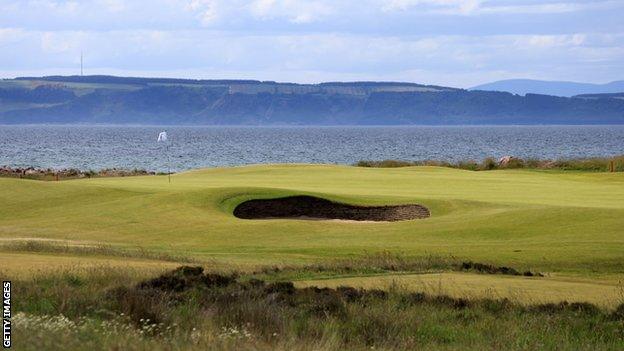'R&A rule amendment to help amateurs and deter cheats'
- Published
- comments

Handicap golfers will not be allowed to accept cash prizes from competitions despite the ratification of new rules that will relax restrictions on amateur status.
Following a six-month consultation period it was decided to amend proposals that would have allowed humble hackers to pick up money for winning club tournaments played on a handicap basis.
New regulations come into force at the start of next year. For the first time they will allow amateurs to receive unlimited sponsorship and display signage to provide exposure and reward for their backers.
Expense-related restrictions will also be lifted and top amateurs will be allowed to pick up cash prizes to a maximum of £700 or $1000 in scratch events where handicaps are not involved.
"There was a concern particularly with handicap golf," said the R&A's director of rules Grant Moir following the completion of the consultation period.
Rule makers were worried players may be encouraged to cheat by playing off a more generous handicap than is commensurate with their ability.
"Cash prizes might just create a greater temptation than ordinary prizes," Moir said.
"And obviously we're very keen to protect and maintain the integrity of the game in relation to how the rules of golf are applied and how the rules of handicapping are applied.
"It's a fine balance in a self-policing game. There was also a concern that there would be more money leaving the golf industry.
"The vouchers and the merchandise that are traditionally given as prizes keeps the money within the club and the industry. So we've changed that aspect and the ability to win prizes of money only applies in scratch-only competitions."
Amateurs who perform well in top professional events, such as Scotland's Louise Duncan who finished tied 10th at this year's AIG Women's Open, would remain unable to accept their full prize money and retain amateur status.
Had the 21-year-old been a professional she stood to pocket about £70,000 for her performance at Carnoustie. As an amateur she received no prize money.
"It's pretty much on the basis of their eligibility," Moir explained. "The reason they qualified or were exempt to the championship is based either on their amateur handicap or what they had won as an amateur.
"Therefore they are in that competition by virtue of their amateur performance. Because of that they are limited in what they can receive."
But Moir says the new rules, which come into force on 1 January 2022, significantly alter the landscape for top players in the unpaid ranks.
"It almost redefines amateurism at the elite level," he said.
"Particularly in relation to the removal of restrictions on contracts, promotion and advertising. It doesn't change anything on the golf course but away from the playing of the game it provides much greater opportunity."
Relaxing sponsorship regulations is aimed at helping high-level amateurs who might not have made it into national representative squads or university scholarships that would ordinarily take care of expenditure issues.
"It means their opportunity to fund their amateur golf through some sponsorship, with the sponsor now able to gain benefit from that sponsorship, it does change the landscape and deliberately so.
"At that elite level, hopefully it makes it more inclusive because more people have potential access to funding that will help them make their way. As we know it costs money to compete."
The new rules also shorten the time professionals, who might want to leave the paid ranks, must wait before regaining their amateur status to six months.
"That's significant," Moir insisted.
"A shorter period means we are less likely to find people getting disillusioned and drifting off from the game. Getting them back in and playing amateur golf at an elite level will be a positive thing."

The 100 Billion Bottle Problem: Is Coca-Cola's pledge to tackle plastic waste on track?
Frankie Boyle's New World Order: The comedian's bold and outrageous way to make sense of the world we live in

